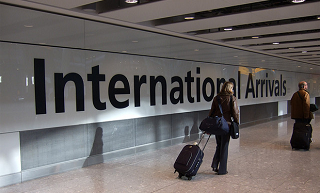Travel tech: Airlines, time to get on board
 Travel by air in a world where connectivity is expected has many repercussions for your average business traveler.
Travel by air in a world where connectivity is expected has many repercussions for your average business traveler.It’s not necessarily a glass of champagne that is now at the top of the list when it boils down to customer expectations. Instead, operators should consider what can be done to facilitate the technological and mobile habits of their clients.
A survey conducted by FlightView of over 600 business-class passengers has implied the same thing; that airlines should be focusing on adapting their services to suit the modern-day consumer rather than offering gimmicks to entice the most lucrative customer base.
FlightView’s new survey found that mobile, easily accessible notifications for day-to-day notifications are now critical for business travelers. Over 94 percent of customers want flight statuses updated through their mobile phones, 63 percent want to be notified about potential seat upgrades, and over 70 percent want an alert when a flight is due to board.
The state of airport and in-flight wireless Internet appears to be a constant source of frustration for travelers. Only 28 percent of business travelers surveyed were “satisfied” with the current WiFi services offered by airlines, and availability of WiFi only performed marginally better — keeping 32 percent happy.
An aspect of travel that the majority of customers want improved is mobile boarding. Over 80 percent of business-class fliers who haven’t yet had access to mobile boarding passes would have used them, if had they been available.
Mike Benjamin, CEO of FlightView said:
“Business travelers, pressed for time, want access to new tools and technologies that make traveling easier and more efficient. Every time an airport or airline rolls out a new offering, it raises travelers’ expectations, which, in turn, puts pressure on others in the industry to quickly adopt and integrate new technologies.”
Efficiency and convenience comes in many guises. Not only do business travelers expect connectivity through wireless Internet services, but they also expect mobile websites and native apps to make travel easier on the go.
68 percent of those surveyed wanted the option to rebook flights through mobile technology, and 36 expect to be able to use their personal devices to purchase upgrades and book ground transportation. Furthermore, almost half would like walking directions to different gates accessible through mobile technology.
Benjamin noted:
“Airlines have a tremendous opportunity to generate more ancillary revenue and traveler loyalty from their highest-spending customers through mobile devices. Our survey found that only 25 percent of business travelers regularly fly first or business class, which makes finding new ways to generate revenue and keep customers — like selling seat upgrades through mobile devices — even more critical.”
If travelers are made to suffer through flights with significant delays or outright cancellations, conflicting information is the number one annoyance of business-class customers (37.3 percent), followed by inaccurate or unavailable updates (35.7 percent), and having no insight into where the plane currently is and when it will arrive at the gate (27 percent).
“Flight information is one thing that airlines and airports need to get right,” said Benjamin. “Delays and cancellations are inevitable, but airports and airlines have a responsibility to provide customers with real-time, accurate updates.”
This business travel survey was conducted in part of a larger research report on travelers and technology. The full research project, containing responses from thousands of customers, will be available in August.
You can return to the main Market News page, or press the Back button on your browser.

